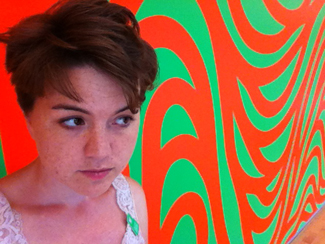Ásta Bennie Hostetter was born in New York City and worked in experimental theater before attending CalArts. Work at school includes: The Firebugs, Cherry Jam (Costumes), and The Life of the Bee (Set). She is an Associated Artist with Target Margin Theater and designed 10 Blocks on the Camino Real (Ohio Theater) and The Argument and The Dinner Party (The Kitchen). Past work includes Babes in Toyland (The Little Lord Fauntleroys), The Misanthrope (dir. Anna Brenner, undergroundzero Festival), The Knockout Blow (Half Straddle), Caucasian Chalk Circle (PL115), Flesh and the Desert (Summer Play Festival) and work with Julia Jarcho: Aria Da Capo and The Highwayman.
TMT: Cripples by David Pinski is one of the first Yiddish plays I read and was instantly floored. I just wasn’t expecting it to sound… I don’t know… so much not like what I thought Yiddish theatre could be. For those who aren’t familiar with the play, tell us why is Cripples is AND isn’t your grandpa’s Yiddish theatre.
ABH: I can’t pretend to be an authority on Yiddish theater. But like most theatre the ritual of theatre serves to uphold, preserve and further the community’s values. Often in the Yiddish theatre family or community are central. Cripples is happily devoid of family values. It’s devoid of most values. Instead it introduces us to four incredibly angry unfortunates and gives them a soapbox for oh, say ten pages. I talk a lot about zero sum games in rehearsal. Because the truth is that each of these people has a passionate personal belief and an ethos which places themselves firmly on the top of the food chain. What is a value system whose only place for others is below ourselves? Well, it doesn’t sound like a conversation. It sounds like a lot of screaming.
TMT: Talk to me a little bit about the Yiddish archetype of the ‘cripple.’ Why does Pinksi single out the cripple in this absurdist take on traditional Yiddish themes.
ABH: I rarely posit today’s American society as enlightened, but at least we don’t call people ‘cripples’ anymore. A ‘cripple’ is a lesser being, somehow less than fully human, functional, healthy or qualified to engage in life. Yet, even though these four are archetypes, I relate to them a lot more than most characters. Samantha, Charlotte, Carrie and Amanda have nothing on these guys. Most people I know are miserable, and though endowed with gifts, talent and knowledge, they go about in hatred, lust and greed. I think Pinski kind of judged that humanity, but I’m interested in honoring it.
TMT: In the past you’ve worked with Target Margin (10 Blocks on the Camino Real, The Argument and The Dinner Party) Half Straddle (The Knockout Blow), and other experimental groups that challenge realistic and naturalistic theatrical tradition. But I wonder if you’ve had a moment where you were so far outside the box you were tempted to jump back in. Like the most experimental thing to do would be to do nothing experimental. Sorry if that question confounds I might be channeling Pinski.
ABH: Whoah. I have been waiting all my life for someone to ask me this question. Like most artists who create “experimental” work I am uncomfortable with the label though I use it often. “Experimental” as opposed to what? Normal. Normal theatre. Here’s what I think about “normal”– it’s a latebreaking concept to modernity and the sooner it makes an exit, the sooner we can start loving our lives. Normality is a concept born of statistics and eugenics. No individual is normal. The normal person is an imagined aggregate of average qualities. I have never known and never loved a normal person. Substitute “person” for “theatre” and the statement stands. Conventional theatre communicates with its audience on average– will Mrs. Jones get it? and her husband? and her kids and her cleaning lady and her lover too? It deploys assumptions about its average audience. I want to make a theater in which the experience for both artists and audience in which we encounter each other honestly as the strange organic beings we are. But it absolutely takes a certain amount of rigor to encounter that oddity honestly rather than slapping it on an art and deeming it experimental.
TMT: What would you do if you didn’t make theatre at all? A lot of people say they would cook. Which I get, it’s a way to create and share. I’m wondering… do you like to cook? And if so is there a traditional Jewish recipe you’d like to share. I can wait for you to google one.
ABH: I wouldn’t cook. I would probably be a hoarder. I’d probably be on TV right now. I’d probably be a shame to all my friends and family. I’d probably own more books than I have given away. I’d probably have a better sex life. I’d probably alienate my friends less and buy retail and have health insurance and cook organic. More probably I would be sharing cat food out of a tin with hundreds of my best friends. I’m really glad I make theatre.
TMT: Lastly, if you had to choose only one of these two fashion accessories to wear for the rest of your life would it be: Borscht belt or Bible belt. I’ll accept suspenders.
ABH: Bible belt. It’s a way more popular club to be a part of.
TMT: It also won’t stain your trousers.
Cripples runs in a Double Bill with After Midnight at The Brick Nov 1st – Nov 3rd at 7:30pm.
Tickets available HERE
